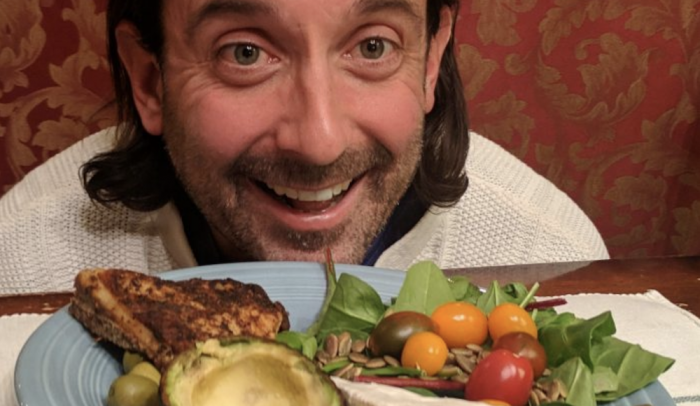Elephant is not your doctor or hospital. Our lawyers would say “this website is not designed to, and should not be construed to provide medical advice, professional diagnosis, opinion, or treatment to you or any other individual, and is not intended as a substitute for medical or professional care and treatment. Always consult a health professional before trying out new home therapies or changing your diet.” But we can’t afford lawyers, and you knew all that. ~ Ed.
~
I became an alcoholic at age seven without taking a drink.
In fact, I wouldn’t drink for another eight or so years when my destiny of addiction was already established.
There are a lot of reasons people become alcoholics. Lack of willpower and childhood trauma are among the most often cited.
But I am a child of the seventies and eighties. We are the processed food generation, when convenience was worshiped and the health consequences were not yet considered. My family marvelled at these culinary machinations at my considerable detriment.
Doritos made me an alcoholic.
“Food choice is the foundation of our health,” said Kelly Miller, certified nutrition recovery coach, during a recent podcast interview on the role of nutrition in addiction recovery. She explained how addictive behaviors, such as drinking alcohol, hijack our reward system in our brain and control our release of neurotransmitters responsible for pleasure. Our dopamine supply, which Kelly refers to as “the spark of life,” is unique as a neurotransmitter in that it is impacted by the use of all different drugs and other potentially addictive activities.
Do you know what else impacts the release of dopamine? Sugar and simple carbs. So when I plowed through half a bag of Doritos every day after school as a child, I was teaching my brain lessons to be reapplied in the future. “It follows the same pathways in the brain. It follows the reward pathways,” Kelly explained when describing the similarities between the way sugar/simple carbs and alcohol interact with our brain function. My after-school snacks set up the bowling pins in my brain, and my drinking later in life knocked them down. My highly processed diet in adolescence left me with cravings that would later be satisfied with booze. My destiny was complete.
Nutrition is the component most often de-emphasized in recovery from addiction. In traditional programs like Alcoholics Anonymous and 12-step-based, 30-day inpatient rehab, nutrition is ignored altogether. I’ve learned through personal experience and the insights of experts like Kelly that nutrition is the missing piece of the puzzle of recovery.
And it is not as simple as eating a healthy diet.
We need to incorporate foods in our diets that regenerate the neurotransmitters that we unwittingly manipulate in active addiction. The only way for our brains to manufacture dopamine, serotonin, endorphins, and gaba is from amino acids found naturally occurring in proteins. We need a diet rich in protein to provide the amino acids necessary to return our brains to proper function. In fact, each of three meals per day should contain 20 to 30 grams of protein so we can get the amino acids we need to thrive in recovery.
I am nine months into following Kelly’s advice, and the results are substantial. She told me I’d lose a few pounds, and she was right. But that wasn’t the most significant change I’ve experienced. My mood improvement has been life-changing. Fixing my broken pleasure pathways in my brain has limited stress, alleviated anxiety, and drastically reduced the frequency of my bouts of depression.
Here’s how this all ties into the success of my permanent sobriety:
When I feel good, I have no cravings to drink. When I am in a good mood, I don’t seek anything to alter my attitude. When I am relaxed and at peace, I don’t have stress or anxiety to artificially sooth.
The reason addiction is so hard to cure is that most components of the disease and the treatment are counterintuitive. When we feel stress or anxiety, we learn that drinking alcohol will make those undesirable emotions go away. What we fail to understand is that alcohol, because it is a poison, also feeds the depression, stress, and anxiety, and keeps them coming back to haunt us relentlessly.
Likewise, in recovery, we learn that consuming sugar appeases our cravings for alcohol. It makes sense, as Kelly explained, because sugar, processed carbs, and alcohol all travel on the same pleasure pathways in our brains. If we refuse to give our brains alcohol, sugar or white flour will suffice. We are so relieved to find temporary relief that we don’t consider the long-term impact.
Consuming sweets or chips in place of alcohol is called “harm reduction,” and it has been embraced by traditional recovery methods for at least a century. But we ignore the science at our peril. Ice cream or cookies or half a bag of Doritos can assuage our need for alcohol or our drug of choice in the short-term, but it ensures that our addiction will live to fight us again tomorrow. And the day after that. Forever.
And that’s why we treat recovery as a lifelong battle. We refuse to accept addiction as a curable disease. Don’t let down your guard. Take it one day at a time. Protect your sobriety above all. Go get a Blizzard when you want a drink. Just. Don’t. Drink.
“Willpower is a function of blood sugar,” Kelly Miller went on to explain. When we drink, we spike our blood sugar. When we consume sugar, we spike our blood sugar. Do you know what our bodies do when we flood them with sugar? We produce insulin to counteract the level of sugar in our blood. When our blood sugar elevates rapidly, we overproduce insulin thus resulting in a blood sugar crash.
What do you think we crave more than anything else when our blood sugar is dangerously low? That’s right, we become desperate for the substance that our brains associate with blood sugar.
So when we need a drink—I mean we are frantic for alcohol from our toenails to our eyelashes—it is often a function of blood sugar. We program our brains to associate certain inputs with certain results. We train ourselves to be alcoholics. This seven-year-old Doritos fiend never had a chance.
Alcoholism doesn’t have to be a lifelong curse. It can be cured. I’m not claiming food can solve our problems alone, but recovery nutrition is the key component that’s missing for most of us. Along with talk therapy, exercise, sleep, and spirituality, a pro-recovery nutrition plan dramatically improves our chances of success in recovery, and substantially improves our quality of sober life.
I treat alcohol like the poison it truly is, and I avoid it like my life depends on it. And I treat processed carbs and sugars like alcohol’s baby-faced cousin happy to stab me in the back and twist the knife.
We are what we eat, after all, and I choose to eat whole foods from clean sources, not because it is trendy, but because I live for the future and not one day at a time.
We all know that knowledge is power. In this case, nutritional education is an enlightening path to freedom.
~
If you’d like a free and simple one-page infographic with a list of foods that support a neurotransmitter generating lifestyle, please click this link so Kelly can email it to you: Pro-Recovery Nutrition.


 Share on bsky
Share on bsky





Read 25 comments and reply